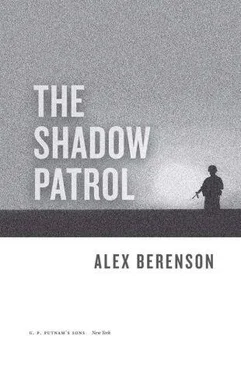Alex Berenson - The Shadow Patrol
Здесь есть возможность читать онлайн «Alex Berenson - The Shadow Patrol» весь текст электронной книги совершенно бесплатно (целиком полную версию без сокращений). В некоторых случаях можно слушать аудио, скачать через торрент в формате fb2 и присутствует краткое содержание. Жанр: Шпионский детектив, на английском языке. Описание произведения, (предисловие) а так же отзывы посетителей доступны на портале библиотеки ЛибКат.
- Название:The Shadow Patrol
- Автор:
- Жанр:
- Год:неизвестен
- ISBN:нет данных
- Рейтинг книги:3 / 5. Голосов: 1
-
Избранное:Добавить в избранное
- Отзывы:
-
Ваша оценка:
- 60
- 1
- 2
- 3
- 4
- 5
The Shadow Patrol: краткое содержание, описание и аннотация
Предлагаем к чтению аннотацию, описание, краткое содержание или предисловие (зависит от того, что написал сам автор книги «The Shadow Patrol»). Если вы не нашли необходимую информацию о книге — напишите в комментариях, мы постараемся отыскать её.
The Shadow Patrol — читать онлайн бесплатно полную книгу (весь текст) целиком
Ниже представлен текст книги, разбитый по страницам. Система сохранения места последней прочитанной страницы, позволяет с удобством читать онлайн бесплатно книгу «The Shadow Patrol», без необходимости каждый раз заново искать на чём Вы остановились. Поставьте закладку, и сможете в любой момент перейти на страницу, на которой закончили чтение.
Интервал:
Закладка:
4
The floors at CIA headquarters were not created equal.
Take the third floor of the New Headquarters Building, home to the unit once called the Directorate of Administration and now known as the Directorate of Support. On its public Web site, which existed mainly as a recruiting tool, the CIA did its best to make the DS sound exciting: “Our job is to ensure that all our mission elements have everything they need for success… while the support we provide may be invisible — the results certainly are not!”
Invisible indeed. The agency’s more glamorous divisions hardly noticed the DS’s existence. But the directorate’s employees soldiered on, administering health plans, making sure the agency wasn’t overcharged for printer paper, and approving the world’s strangest expense reports: Six vials cobra antivenom: $360. No one but DS employees ever went to the third floor of the NHB.
Which made it the perfect place for a sterile room.
BC1-3-114 had once been a supply closet. The evacuation plans that the DS so meticulously maintained still identified it as one. The only clue to its new use came from the keypad and thumb reader that opened its magnetic door lock. Inside, it held a steel desk, two battered chairs, a phone — and a computer that with the right passwords could access any agency database. Even ones that were supposed to be available only on much more important floors.
SHAFER HAD JUST EXPLAINED the setup to Wells, who was back at Langley for the first time in almost a year. He’d come directly from Montana, not even stopping in New Hampshire for a change of clothes.
“Doesn’t a room like this violate every rule of computer security ever created?”
“ Every and ever are redundant, John. And have you been studying network architecture in your spare time?”
“Seriously, Ellis?”
“Seriously. First, you need passwords. Both on this end and for the database you’re accessing. Second, the mirroring software works only in this room. Third, and most important, nobody knows it’s here.”
“Who exactly is nobody?”
“Me, Vinny, a couple others. We installed it last year, and it’s been used only twice, in situations like this, when we want to get somebody up to speed quietly. This way, you can read every file from Kabul station and nobody will know.”
“I get it, Ellis.” Despite all Wells had done, Shafer still sometimes treated him like a quarterback who needed extra time in the video room.
“Okay, you get it.”
“What I don’t get is what I’m looking for.”
“Just read.”
THE CASE FILES from Kabul painted a bleak picture. The station was the ultimate hardship post. Officers left their families on another continent and risked kidnapping and assassination every day. Unlike the Army or Marines, the CIA was a civilian organization that couldn’t order its employees to take dangerous jobs. Most officers stayed a few months, just long enough to put an Afghan posting on their résumés.
Building real relationships with the tribal chiefs who ran Afghanistan took much longer. That work fell to a cadre of hard-core operatives who lived in Kabul for years. By mid-2009, their efforts were paying off. They were a long way from the leaders of the Taliban or al-Qaeda, but they were moving up the ranks.
Then Marburg showed up.
The Marburg reports covered sixteen hundred pages and included scores of photographs, everything from the first surveillance shots of Rashid to the carnage at Camp Holux. A separate file contained the video from the Karachi hotel where Marci Holm had met Ahmad Rashid. The file ended with the eighty-nine-page after-action report from the agency’s internal investigation.
The report’s language was passive, but its meaning was clear. The agency blamed Manny Cota and Marci Holm for the disaster.
SUMMARY/CONCLUSIONS
MARBURG penetrated Holux due to avoidable operational error. It is true that some agents initially reject physical searches. The successful case officer must overcome those doubts and convince the agent that a pat-down protects both CO and agent. Holm never established those ground rules with MARBURG. Holm did not explain in her case reports why she did not insist that MARBURG be searched. Other officers recall that Holm said she found MARBURG personally charming.
Both Holm and Cota believed that MARBURG had extremely high-value intelligence. In their eagerness, the officers missed warning signs, most notably the ease with which MARBURG supposedly penetrated AQ. It is simply not credible that an outsider such as MARBURG would meet Ayman al-Zawahiri so quickly.
Once the officer who picked up MARBURG questioned whether he might be wearing an explosive vest, prudence and protocol dictated a physical search. Either Holm or Cota should have insisted on such a search.
RECOMMENDATIONS
1) Case officers must inform ALL sources/agents that they will be patted down before being allowed onto any secure facility. If an agent protests, his or her officer will explain that the rule must be followed without exception.
2) No more than five agency officers/contractors shall be present at any meeting with an agent. A closed-circuit video link may be provided for additional officers. Authorization at the DD or higher level shall be required to override this rule.
3) Case officers shall encourage agents to take regular polygraph tests. If an agent resists, cash compensation may be offered.
The recommendations continued for several pages. Some made sense, like limiting the size of meetings. Others were irrelevant, like the suggestion that all spies should be polygraphed. That idea might have sounded good at Langley, but it had nothing to do with the way case officers actually worked.
All in all, the report was what Wells expected. The agency had to hold someone responsible for this disaster, if only so that it could tell its political masters what it had learned from its mistakes. Holm and Cota couldn’t defend themselves, so they’d taken the blame. The nastiest line in the report was a throwaway, that Holm “found MARBURG personally charming.” The implication was obvious.
In the video from Karachi, Rashid had impressed Wells as smooth and convincing, right down to his supposed concerns about his family. Wells wasn’t sure that he would have known Rashid was a double. But he would have searched Rashid before letting him inside Holux. Pat-downs were a part of life these days. For whatever reason, Holm had let him through. Two-plus years later, Kabul station was still recovering.
Duto had appointed Jimmy Wultse to replace Cota as station chief just seventy-two hours after the bombing. The choice had seemed solid. Wultse, the chief for Tajikistan, knew Afghan politics intimately. Unfortunately, he also had a drinking problem. He’d managed it in Dushanbe, but the stress of Kabul turned him into a full-blown alcoholic. After four months, Duto ordered him back to the United States for rehab.
Duto’s next choice was Gordie King, an agency veteran who’d spent most of his career in South America. Wells understood the choice. King had a reputation as an old-school butt-kicker. Unfortunately, King didn’t speak Pashtun and disliked Afghanistan intensely. He rarely left his office when he was in Kabul. Making matters worse, he refused to choose a deputy.
Under King, the station slipped into crisis. Case officers cut their tours short and were not replaced. Senior officers in Afghanistan’s intelligence service began skipping their weekly meetings with the agency. Two top sources in eastern Afghanistan were assassinated. Fifteen months after Marburg, the CIA’s intelligence-gathering effort in Afghanistan existed mostly on paper. Its operations consisted of drone strikes and payoffs to supposedly friendly tribal chiefs.
Читать дальшеИнтервал:
Закладка:
Похожие книги на «The Shadow Patrol»
Представляем Вашему вниманию похожие книги на «The Shadow Patrol» списком для выбора. Мы отобрали схожую по названию и смыслу литературу в надежде предоставить читателям больше вариантов отыскать новые, интересные, ещё непрочитанные произведения.
Обсуждение, отзывы о книге «The Shadow Patrol» и просто собственные мнения читателей. Оставьте ваши комментарии, напишите, что Вы думаете о произведении, его смысле или главных героях. Укажите что конкретно понравилось, а что нет, и почему Вы так считаете.

![Brian Jacques - [Redwall 10] - The Long Patrol](/books/128376/brian-jacques-redwall-10-the-long-patrol-thumb.webp)










